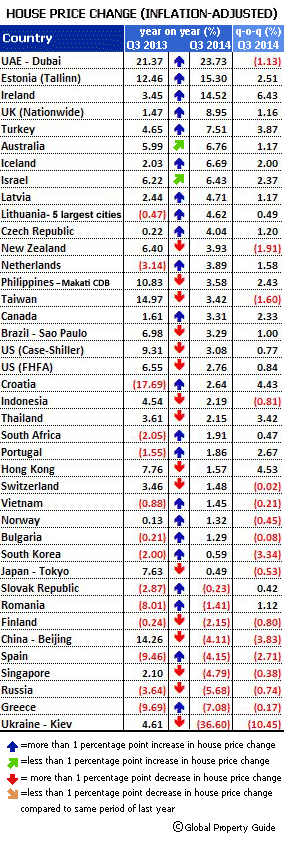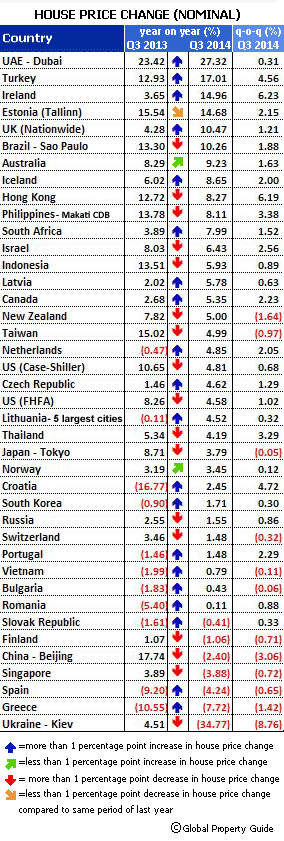Europe is back! Four of the five strongest housing markets in our global survey were in Europe. In all, seventeen European markets performed better during the year to Q3 2014 than the previous year, and only four showed weaker momentum: Russia, Ukraine (down 36.60%), and Finland and Switzerland which had modest price-gains, but smaller gains than last year. Everywhere else in Europe, housing market momentum was stronger this year than last.
The wider context is that the global house price boom continues. House prices rose in 30 of the 39 world's housing markets which so far published housing statistics, using inflation-adjusted figures. The more upbeat nominal figures, more familiar to the public, showed house price rises in 32 countries, and declines in only 7 countries.
Dubai was the world's top performer, with housing prices rising 23.73% during the year to Q3. However, housing prices in Dubai fell slightly during the latest quarter.
And while house prices have continued to rise in the United States, as in several Asian countries, Brazil, and New Zealand, momentum in almost all of these countries has weakened, and China's housing markets have entered a downturn, as has Singapore's.
Inflation-adjusted figures are used throughout this release.
Momentum is a measure of the "change in the change"; simply put, if a property market has risen faster this year than last (or fallen less) momentum has increased. 24 housing markets showed stronger upward momentum during the year to Q3 2014 than during the same period last year, while 15 housing markets showed weaker momentum.
By Region:
- Dubai remains the best performer in our global house price survey, with house prices rising by 23.73% during the year to Q3 2014. However, this was a deceleration from annual rises of 33.26% in Q2 2014 and 31.57% in Q1 2014, mainly due a housing market cooling measures imposed by the government. The economy continues to grow at a healthy pace. In Israel the average price of owner occupied dwellings rose by rose by 6.43% during the year to Q3 2014, after y-o-y increases of 5.95% in Q2 2014, 3% in Q1 2014, and 5.38% in Q4 2013.
- Pacific housing markets showed mixed results. Australia remains strong. House prices in the country's eight major cities rose by 6.76% during the year to Q3 2014, from annual rises of 7.12% in Q2 2014, 7.82% in Q1 2014, 7.42% in Q4 2013 and 6% in Q3 2013. The strength of Australia's housing market is driven by record low interest rates, strong demand from foreign homebuyers and heathy economic growth. New Zealand slowed sharply, with the median house prices rising by just 3.93% during the year to end-Q3 2014, after a 6.4% y-o-y increase in Q3 2013. House prices actually dropped 1.91% q-o-q during Q3 2014. While construction activity continues to increase, demand is now falling.
- Four out of the five strongest housing markets in our global survey were in Europe. In Tallinn, Estonia, best performer in Europe, the average price of dwellings surged by 15.3% during the year to Q3 2014, up from the 12.46% growth seen last year. House prices increased 2.51% q-o-q during the latest quarter. This was fuelled by an improving economy. In Ireland, residential property prices rose 14.52% during the year to Q3 2014, a remarkable improvement from a y-o-y increase of 3.45% in the same period last year. Irish house prices rose strongly by 6.43% q-o-q in Q3 2014. The UK property market continued to show impressive performance. Nationwide house prices rose by 8.95% y-o-y in Q3 2014, a sharp improvement from an annual increase of 1.47% in the previous year and the second biggest increase since Q4 2004. In Turkey, house prices rose by 7.51% during the year to Q3 2014, after an annual rise of 4.65% in the previous year. House prices increased strongly by 3.87% during the latest quarter. Likewise, Iceland's property market also performed strongly, with house prices rising by 6.7% during the year to Q3 2014, more than thrice the 2% y-o-y increase seen in the same period last year.
Other strong European housing markets include Latvia, with house prices rising by 4.71% during the year to Q3 2014, Lithuania (4.62%), Czech Republic (4.04%), and the Netherlands (3.89%). All showed better performance in Q3 2014 compared to the previous year. Moreover, all saw positive q-o-q growth in Q3 2014.
Croatia saw a house price rise of 2.64% during the year to Q3 2014 - a truly dramatic recovery from a decline of 17.69% during the same period last year. Portugal (1.86%), Switzerland (1.48%), Norway (1.32%) and Bulgaria (1.29%) also had price rises. All, except Switzerland, performed better in Q3 2014 compared to a year earlier. However of these, only Croatia and Portugal saw positive quarterly growth during the latest quarter.
The Balkans' good news story includes both Romania and Slovakia, with strongly falling house-price declines year-on-year, and during latest quarter housing prices up by 1.12% and 0.42% respectively.
- The US housing market's upward momentum is slowing sharply. The S&P/Case-Shiller seasonally-adjusted national home price index rose by 3.08% during the year to end-Q3 2014, down from y-o-y price rises of 4.12% in Q2 2014, 7.28% in Q1 2014, 9.1% in Q4 2013, and 9.31% in Q3 2013. Likewise, FHFA's seasonally-adjusted purchase-only U.S. house price index rose by just 2.76% y-o-y in Q3 2014, the lowest annual increase in the past eight quarters. US residential construction activity and property transactions are also slowing.
- Canada's housing market gathering pace. House prices in Canada's eleven major cities rose by 3.31% during the year to Q3 2014, up from a 1.61% annual rise in a year earlier, despite repeated market cooling measures. On a quarterly basis, house prices increased 2.33% in Q3 2014.
- Asian housing markets continue to lose steam. Only two of the ten Asian markets for which figures are available in Q3 2014 performed better in momentum terms than the previous year, while the remaining eight housing markets lost momentum. In the Philippines, the average price of 3-bedroom condominium units in Makati CBD rose by 3.58% in Q3 2014 from a year earlier, a sharp deceleration from 10.83% price rises during the same period last year. Housing prices increased 2.43% q-o-q during Q3 2014. In Taiwan, house prices rose by just 3.42% during the year to Q3 2014, a sharp slowdown the dramatic price-rise of 14.97% over the same period last year and the slowest annual growth seen since Q2 2009. House prices actually dropped 1.6% during Q3 2014. In Indonesia, residential prices in the country's 14 largest cities rose by just 2.19% y-o-y in Q3 2014, down from 4.54% in the same period last year. Housing prices actually fell by 0.81% q-o-q in Q3 2014. In Thailand, housing prices rose by 2.15% during the year to Q3 2014, down from 3.61% the previous year. Hong Kong's residential property prices rose minimally by 1.57% during the year to Q3 2014, a slowdown from 7.76% growth a year earlier (though Hong Kong's housing prices may now be picking up).
Asian countries which showed minimal house price increases included Vietnam, with house prices rising by 1.45% during the year to Q3 2014, South Korea (0.59%) and Tokyo, Japan (0.49%). All saw quarterly price declines in Q3 2014. However, of these only Japan showed poorer performance in Q3 2014 compared to the previous year.
China's once booming property market is now weakening significantly. In Beijing the price index of second-hand residential buildings fell by 4.11% during the year to Q3 2014, in sharp contrast with the spectacular growth of 14.26% over the same period last year. During the latest quarter house prices in Beijing fell by 3.83%.
Singapore's house prices also fell by 4.79% during the year to Q3 2014, in contrast with an annual increase of 2.1% in Q3 2013. House prices fell by 0.38% q-o-q in Q3 2014. Demand is falling and the economy is also slowing sharply.
- South Africa's housing market improved, with the nationwide price index for medium-sized apartments rising by 1.91% during the year to Q3 2014, up from an annual rise of just 0.27% in Q2 2014 and 0.49% in Q1 2014, and y-o-y declines of 1.3% in Q4 2013 and 2.05% in Q3 2013. House prices increased by 0.47% during the latest quarter.
- Brazil's housing market losing momentum. Gone are the days of double-digit house price increases in Brazil. During the year to Q3 2014, Sao Paulo's house prices rose by just 3.29%, the slowest growth in the past six years. Quarter-on-quarter, house prices increased 1% in the latest quarter.
Conclusion: Because many housing markets are now considered overvalued, Asian governments in particular are imposing cooling measures to avoid a repeat of the past. However housing markets in much of the rest of the world are rising faster than before.

|
| Source: Various series, data descriptions and sources here |
U.S. housing market slowing sharply
In the United States house price rises are now decelerating sharply. The S&P/Case-Shiller seasonally-adjusted national home price index rose by 3.08% during the year to end-Q3 2014, down from y-o-y price rises of 4.12% in Q2 2014, 7.28% in Q1 2014, 9.1% in Q4 2013, and 9.31% in Q3 2013. House prices increased by just 0.77% during the latest quarter.
Despite this most of the 20 major U.S. cities saw strong house price rises, with Miami registering the biggest y-o-y increase of 10.3% in Q3 2014, followed by Las Vegas (9.1%), San Francisco (7.9%), Dallas (7.4%), Portland (6.7%), Denver (6.2%), and Seattle (6%).
The national slowdown is confirmed by Federal Housing Finance Agency's seasonally-adjusted purchase-only U.S. house price index, which rose by just 2.76% y-o-y in Q3 2014, the lowest annual increase in the past eight quarters. The index increased a meagre 0.84% q-o-q during the latest quarter.
Residential construction activity is also slowing. New privately-owned housing unit starts rose by 7.8% y-o-y during the year to October 2014, according to the U.S. Census Bureau, while housing completions rose by 8.1% y-o-y. These were a sharp slowdown from double-digit rises seen in the previous periods.
New house sales increased by just 1.8% in October 2014 from the same period last year, according to the U.S. Census Bureau. About 55% of these transactions were in the South. U.S. home builder sentiment rose in November 2014 to 58, up from 54 in the previous month, according to the National Association of Home Builders. A reading of 50 is the midpoint between positive and negative sentiment.
Cheaper mortgages, especially short-term mortgages, continue to fuel housing demand. The average interest rate for 1-year adjustable rate mortgages (ARMs) fell to a 2.41% in October 2014 from 2.63% a year earlier, according to Freddie Mac. The average interest rate for 30-year FRMs was just 4.04% in October 2014, down from 4.19% a year earlier.
U.S. economic growth in Q3 2014 surpassed expectations, at 3.9%, from a growth of 4.2% in Q2 2014, and an annual decline of 2.1% in Q1 2014. The U.S. economy is expected to expand by 2.2% this year and by another 3.1% in 2015.
Canada's housing market gaining momentum
House prices in Canada's eleven major cities rose by 3.31% during the year to Q3 2014, up from a 1.61% annual rise a year earlier, despite repeated market cooling measures. On a quarterly basis, house prices increased 2.33% in Q3 2014.
Biggest rises: Calgary saw the highest inflation-adjusted y-o-y increase of 7.33% in Q3 2014, followed by Toronto (5.32%), Vancouver (4.41%), Hamilton (3.52%) and Edmonton (3.01%). Winnipeg and Halifax registered meagre growths of 0.57% and 0.27%, respectively.
Biggest falls: Victoria recorded the biggest price drop of 2.42% y-o-y to Q3 2014, followed by Ottawa (-1.84%), Quebec (-1.48%), and Montreal (-1.26%).
Actual sales activity increased 5.2% during the first ten months of 2014 from the same period last year, according to the Canadian Real Estate Association(CREA).
The Bank of Canada has kept its key interest rate at 1% since September 2010. "Low interest rates continued to support sales in some of Canada's more active and expensive urban housing markets and factored into the monthly increase for national sales," said CREA President Beth Crosbie. Canada's economy is expected to grow by a modest 2.3% this year, from growth rates of 2% in 2013 and 1.7% in 2012, according to the IMF.
Australia remains strong, but NZ's house price rises are slowing
Australia is the sixth best performer in our global house price survey. House prices in the country's eight major cities rose by 6.76% during the year to Q3 2014, from annual rises of 7.12% in Q2 2014, 7.82% in Q1 2014, 7.42% in Q4 2013 and 6% in Q3 2013. House prices increased 1.17% q-o-q in Q3 2014.
The Reserve Bank of Australia (RBA) kept its cash rate at a record low of 2.5% in November 2014, after cutting it by 25 basis points in August 2013.
However, residential construction is now falling. In September 2014, dwelling units approved (seasonally-adjusted) fell by 11% from a year earlier, according to the Australian Bureau of Statistics (ABS).
Australia's economy is expected to post a modest growth of 2.8% this year, from annual GDP growth rates of 2.3% in 2013, 3.6% in 2012, and 2.6% in 2011, according to the IMF.
New Zealand's housing market has slowed sharply in momentum terms. Nationwide median house prices rose 3.93% during the year to end-Q3 2014, after a 6.4% y-o-y increase in Q3 2013. However, house prices actually dropped 1.91% q-o-q during Q3 2014.
Dwelling consents increased by 14% y-o-y to 2,152 units in October 2014, according to Statistics New Zealand, with the total value of dwelling consents soaring 18.6%.
The Reserve Bank of New Zealand (RBNZ) kept its official cash rate (OCR) unchanged at 3.5% in October 30, 2014, after raising it four times in the past nine months to its highest level since January 2009.
Property demand continues to fall, partly due to the RBNZ's restrictions on high loan-to-value ratio lending. Total dwellings sold were down 2.4% y-o-y to 6,608 units in October 2014, according to the Real Estate Institute of New Zealand (REINZ). The median number of days to sale eased by three days, to 34 days in October 2014, compared to a year ago.
New Zealand's economy is expected to grow by 3.6% this year, its strongest performance since 2007, according to the International Monetary Fund (IMF), after modest real GDP growth rates of 2.8% in 2013, 2.5% in 2012 and 1.9% in 2011.
Asia continues to lose steam
Eight of the ten Asian markets saw house prices rise during the year to Q3 2014. However, house price increases were at most modest. Only two of the ten Asian markets for which figures are available in Q3 2014 performed better than the previous year while the remaining eight housing markets performed worse.
In the Philippines, the average price of 3-bedroom condominium units in Makati CBD rose by 3.58% in Q3 2014 from a year earlier, a sharp deceleration from 10.83% price rises during the same period last year. Housing prices increased 2.43% q-o-q during Q3 2014.
The number of residential licenses applied for was virtually flat during the first eight months of 2014, growing by a meager 0.3% from a year earlier, based on figures from the Housing and Land Use Regulatory Board.
The country's property prices soared by 19.5% from Q1 2011 to Q4 2013, amidst rapid economic growth. However, economic growth slowed to 5.3% in Q3 2014 from a year earlier, after expanding by 6.4% in the previous quarter and by 7.2% for the whole year of 2013. The economy is expected to expand by 6.2% this year, according to the IMF.
Likewise, Taiwan's house prices rose by just 3.42% during the year to Q3 2014, a sharp slowdown the dramatic price-rise of 14.97% over the same period last year and the slowest annual growth seen since Q2 2009. House prices actually dropped 1.6% during Q3 2014.
Housing prices in Taipei rose 91.6% between Q4 2008 and the first quarter of 2014. Faced by an out-of-control housing market, in March 2014 the country's legislature voted to raise the property tax rate for non-owner-occupied residential properties to between 1.5% and 3.6%, from the current tax range of between 1.2% and 2%. This is in addition to the domestic luxury tax scheme since July 2011, where second homes not occupied by the owner and sold within one year of purchase are taxed at 15%, and within two years of purchase at 10%.
The measures adversely affected the housing market. In September 2014, property transactions plunged by 20% y-o-y in Taipei, New Taipei and Taoyuan. Real GDP growth is expected at 3.5% this year, up from 2.1% in 2013 and 1.5% in 2012, according to the IMF.
In Indonesia, residential prices in the country's 14 largest cities rose by just 2.19% y-o-y in Q3 2014, down from 4.54% in the same period last year. Housing prices actually fell by 0.81% q-o-q in Q3 2014. Economic growth is also gradually slowing. The country's real GDP growth rate is expected at 5.16% this year, from 5.8% in 2013, 6.3% in 2012 and 6.5% in 2011, according to the IMF.
In Thailand, housing prices rose by 2.15% during the year to Q3 2014, down from 3.61% the previous year. Housing prices rose by 3.42% q-o-q in Q3 2014. Economic growth is also expected to slow to 0.96% this year, from annual growth rates of 2.9% in 2013 and 6.5% in 2012.
Hong Kong's residential property prices rose minimally by 1.57% during the year to Q3 2014, a sharp slowdown from the 7.76% growth in a year earlier. The continued slowdown in the housing market is mainly due to government cooling measures. Housing prices increased 4.53% q-o-q during Q3 2014.

Yet demand is rising. The total number of homes sold rose by 20.5% y-o-y to 46,761 units during the first nine months of 2014, according to the Ratings and Valuation Department (RVD). The economy is expected to expand by 3% this year, after 2.9% in 2013 and 1.6% in 2012.
Asian countries with minimal house price increases included Vietnam, with house prices rising by 1.45% during the year to Q3 2014, South Korea (0.59%) and Tokyo, Japan (0.49%). All saw quarterly price declines in Q3 2014. However, only Japan showed poorer performance in Q3 2014 compared to the previous year.
There were residential price falls in two major places in Asia:
China's once booming property market has slowed significantly. In Beijing the price index of second-hand residential buildings fell by 4.11% during the year to Q3 2014, in sharp contrast with the spectacular growth of 14.26% over the same period last year. During the latest quarter house prices in Beijing fell by 3.83%.
New home prices in 69 of the 70 major Chinese cities monitored by the National Bureau of Statistics (NBS) recorded monthly declines in September 2014. Only the southern city of Xiamen saw stable prices during the period. In addition, homes sales plunged 11% in the first nine months of 2014 from the previous year.
In an effort to boost the property market, the government recently decided to ease property curbs. Moreover, the central bank loosened mortgage restrictions in September 30, 2014, giving homeowners who have paid off their mortgages and want a second property the same advantages as first-time buyers, including a 30% minimum down payment, compared with a minimum of 60% previously imposed.
With the faltering property market adversely affecting manufacturing and investment, China's economic growth slowed to 7.3% in Q3 2014, its slowest growth rate since early 2009. The world's second largest economy is projected to grow by 7.4% this year, the lowest growth since 1990, according to the IMF.
Singapore's house prices also fell by 4.79% during the year to Q3 2014, in contrast with an annual increase of 2.1% in Q3 2013. House prices fell by 0.38% q-o-q in Q3 2014.
Demand is falling. The number of private residential units sold plunged 38.6% to 1,465 units in Q3 2014 from a year earlier, according to the Urban Redevelopment Authority. Singapore's economy is projected to grow by 2.96% this year, from 3.9% in 2013, 2.5% in 2012, and 6% in 2011, according to the IMF.
Dubai's property price rises decelerate, Israel remains strong
Dubai remains the star performer in our global house price survey for the seventh consecutive quarter. However, property price increases decelerated to an average of 23.73% during the year to Q3 2014, down from annual rises of 33.26% in Q2 2014 and 31.57% in Q1 2014. House prices dropped 1.13% during the latest quarter.
Dubai's authorities and property developers have taken measures to reduce speculation in off-plan sales, a primary cause of the property slump in 2008. "Speculation has been reduced dramatically. Speculators are being driven out of the business," said Hussain Sajwani of Damac Properties.
Dubai saw one of the world's worst housing crashes from Q3 2008 to Q3 2011, with house prices plunging by 53%. Then in Q2 2012, Dubai's housing market started to recover. Since then, Dubai saw double-digit house price increases.

The UAE's economy is expected to expand by 4.3% this year, after real GDP growth rates of 5.2% in 2013 and 4.7% in 2012, according to the IMF.
Israel's housing market remains strong. The nationwide average price of owner-occupied dwellings rose by 6.43% during the year to Q3 2014, after y-o-y increases of 5.95% in Q2 2014, 3% in Q1 2014, and 5.38% in Q4 2013. House prices increased 2.37% q-o-q in Q3 2014.
Yet demand continues to fall. New dwellings sold dropped 16.4% to 17,327 units in the first ten months of 2014, from the same period last year, according to the Central Bureau of Statistics (CBS). New dwelling supply rose by 16.12% y-o-y, to 26,887 units in October 2014.
The oversupply is likely to be temporary, as dwelling starts and completions are now declining.
Israel's economy is expected to grow by 2.5% this year and 2.8% in 2015, after average growth of 3.1% the past two years. The Bank of Israel kept its benchmark interest rate at a record low of 0.25% in November 2014, after cutting it in August amid the Gaza conflict.
Europe's property market boom rolls on
Four of the five strongest housing markets in our global survey were in Europe. In all, seventeen European markets performed better during the year to Q3 2014 than the previous year, and only four showed weaker performance during the said period.
Estonia remains the best performer in Europe and the second best housing market in our global survey. In Tallinn, the average price of dwellings surged by 15.3% during the year to Q3 2014, up from the 12.46% growth seen last year. House prices increased 2.51% q-o-q during the latest quarter. The number of purchase-sale contracts of real estate fell by 2.1% y-o-y in Q3 2014, while transaction values were up by 2.2% over the same period, according to Statistics Estonia.
Estonia's real GDP growth stood at 2.1% in Q3 2014 from a year earlier, after an annual growth of 2.2% in Q2 2014 and an annual decline of 1.4% in Q1 2014, based on figures from Statistics Estonia. The economy is expected to grow slightly by 1.2% this year, from annual growth rates of 1.6% in 2013, 4.7% in 2012, 8.3% in 2011, and 2.5% in 2010, according to the IMF.
Ireland retained its spot as the third best performer in our global survey, with residential property prices surging by 14.52% during the year to Q3 2014, a remarkable improvement from a y-o-y increase of 3.45% in the same period last year. House prices rose strongly by 6.43% q-o-q in Q3 2014. The Irish economy is projected to expand by a healthy 3.6% this year, after a meagre growth of 0.17% in 2013 and a contraction of 0.3% in 2012, according to the IMF.

The UK property market continued to show impressive performance. Nationwide house prices rose by 8.95% y-o-y in Q3 2014, a sharp improvement from an annual increase of 1.47% in the previous year and the second biggest increase since Q4 2004. House prices rose by 1.16% q-o-q in Q23 2014.
The economy grew by 3% in Q3 2014 from a year earlier, after annual real GDP growth rates of 3.2% in Q2 and 2.9% in Q1 2014. The UK economy is projected to expand by 3.2% this year, up from real GDP growth rates of 1.7% in 2013, 0.3% in 2012 and 1.1% in 2011.
Turkey is the fifth best performer in our global house price survey. House prices in Turkey rose by 7.51% during the year to Q3 2014, after an annual rise of 4.65% in the previous year. House prices increased strongly by 3.87% during the latest quarter. The Turkish economy is expected to expand modestly by 3% this year, from annual growth rates of 4% in 2013 and 2.1% in 2012.
Iceland's property market also performed strongly, with house prices rising by 6.7% during the year to Q3 2014, more than thrice the 2% y-o-y increase seen in the same period last year. House prices increased 2% during the latest quarter. Iceland's economic growth is expected to be 2.9% this year, after growth rates of 3.3% in 2013 and 1.5% in 2012.
Other strong European housing markets include Latvia, with house prices rising by 4.71% during the year to Q3 2014, Lithuania (4.62%), Czech Republic (4.04%), and Netherlands (3.89%).
All of the abovementioned European countries showed better performance in Q3 2014 compared to the previous year. Moreover, all saw positive q-o-q growth in Q3 2014.
Croatia also showed strong turnaround. Croatian house prices rose by 2.64% during the year to Q3 2014, in sharp contrast with the 17.7% annual decline seen in the previous year. This was despite an economic contraction of 0.5% y-o-y in Q3 2014, following an annual decline of 0.8% in the previous quarter. The country has been stuck in a protracted recession since the start of 2009, with two short spells of positive growth in Q3 2010 and in Q2 2011. The economy is expected to decline by 0.8% this year, the country's sixth consecutive year of economic contraction.
European housing markets with modest house price rises included Portugal, with house prices rising by 1.86% during the year to Q3 2014, Switzerland (1.48%), Norway (1.32%) and Bulgaria (1.29%). All, except Switzerland, performed better in Q3 2014 compared to a year earlier. However, only Portugal saw positive quarterly growth during the latest quarter.
Several European housing markets remain weak
Seven of the 21 European housing markets included in our global survey saw house price falls during the year to Q3 2014.
Ukraine remained the world's weakest housing market in our survey. In Kiev the average price of new residential properties plummeted by 36.6% y-o-y in Q3 2014, in contrast with annual rises of 4.61% in Q3 2013 and 2.14% in Q3 2012. House prices in the capital plunged 10.45% q-o-q in Q3 2014. This could be mainly attributed to a surge in inflation in Ukraine. In October 2014, the country's inflation rate soared to 19.8%, up from 17.5% and 14.2% in the previous months and the fastest rate since February 2009.
An eight-month military conflict with pro-Russian separatists in the east is now adversely affecting the currency, driving up food prices, and pushing Ukraine deeper into recession. The economy is projected to decline by 7% this year, after an annual contraction of 0.04% in 2013 and an annual growth of 0.25% in 2012. Said separatist conflict has wiped out almost 25% of industrial output in the country.
Greece continues to show improvement, though it remains the world's second weakest housing market in our global survey. Greek house prices fell by 7.08% during the year to Q3 2014, an improvement from y-o-y declines of 9.69% in Q3 2013 and 13.58% in Q3 2012. However, Greek house prices declined by only 0.17% q-o-q in Q3 2014.
Greece's economy is likely to grow by 0.6% this year, after six years of contraction, according to the Hellenic Statistical Authority (ELSTAT).
Russia's housing market woes continue. Residential property prices dropped 5.68% y-o-y in Q3 2014, after annual price decline of 3.64% in Q3 2013, and a y-o-y rise of 9.8% in Q3 2012. House prices dropped 0.74% q-o-q in Q3 2014.
The Russian economy is expected to grow by a meagre 0.24% this year, after real GDP growth rates of 1.3% in 2013, 3.4% in 2012 and 4.3% in 2011, according to the IMF.
Other European housing markets which saw minimal to modest house price falls included Spain, with house prices falling by 4.15% during the year to Q3 2014, Finland (-2.15%), Romania (-1.41%) and Slovak Republic (-0.23%). Spain and Finland saw quarterly price declines in Q3 2014, while Romania and Slovak Republic saw quarterly price increases. All, except Finland, showed better performance in Q3 2014 compared to the previous year.
Brazil's housing market slowing sharply
Gone are the days of double-digit house price increases in Brazil. During the year to Q3 2014, Sao Paulo's house prices rose by just 3.29%, the slowest growth in the past six years. Quarter-on-quarter, house prices increased 1% in the latest quarter.
The economy managed a meagre 0.1% growth during the third quarter of 2014, removing the country from a technical recession. The economy shrank by 0.6% during the second quarter, following a 0.2% contraction in the first quarter, showing that the FIFA World Cup did not have the positive effect on the economy that officials anticipated. The economy is expected to grow by 0.3% this year, down from annual real GDP growth rates of 2.5% in 2013, 1% in 2012, 2.7% in 2011 and 7.5% in 2010, according to the IMF.
Propelled by Banco Central interest rate cuts from a high of 26% in 2003, to 7.25% in 2012, house prices in Sao Paulo soared by 113% (inflation-adjusted) from 2007 to 2013, while Rio De Janeiro's rose by 144%.
However starting in the first half 2013, the central bank raised the benchmark interest rate nine times to 11% in April 2014 to curb inflation. This resulted to sharp economic slowdown. After holding the key interest rate for almost seven months, the central bank decided to raise it again by 25 basis points to 11.25% in October 30, 2014, the highest rate since 2011. In an effort to buoy economic growth, the government injected US$12 billion into the economy in September 2014.

|
| Source: Various series, data descriptions and sources here |
South Africa's housing market improving
South Africa's price index for medium-sized apartments rose by 1.91% during the year to Q3 2014, up from an annual rise of just 0.27% in Q2 2014 and 0.49% in Q1 2014, and y-o-y declines of 1.3% in Q4 2013 and 2.05% in Q3 2013. House prices increased by 0.47% during the latest quarter.

House prices in South Africa declined by 15.5% during the global financial crisis from Q4 2007 to Q2 2009. After a short-lived recovery in 2010, the housing market struggled again, with house prices falling by 1.3% from Q1 2011 to Q4 2013. The housing market has seen gradual improvement this year.
The South African economy grew by 1.4% y-o-y in Q3 2014, from annualized real GDP growth rates of 1.3% in Q2 2014 and 1.9% in Q1 2014, according to Statistics South Africa. The economy is expected to expand by 1.4% this year, the slowest growth since 2010, according to the IMF.
The South African Reserve Bank (SARB), the country's central bank, left its benchmark repurchase rate unchanged at 5.75% in November 2014, as inflationary pressures eased and growth prospects remain weak. The SARB raised the repo rate by 25 basis points in January and by another 50 basis points in July 2014 to control inflation.